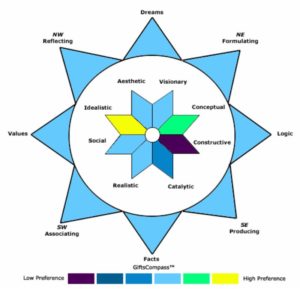Although the unconscious thinking is archaic, its reductive tendencies help to compensate the occasional fits of trying to exalt the ego into the subject. If this should nevertheless happen as a result of complete suppression of the counterbalancing subliminal processes, the unconscious thinking goes over into open opposition and gets projected. – C.G. Jung
In the last article, we reviewed the more primitive attributes of extraverted thinking as a shadow type. In this article, we will consider it as a shadow projection, and also in its more destructive oppositional role to extreme one-sidedness.
Extraverted Thinking as Projection

A person with extraverted thinking as the “inferior” or “shadow” type will tend to feel uncomfortable about logical thinking, and may feel inferior to people who use this type well. He may avoid dealing with pragmatic and logistical matters, concealing his felt inferiority behind the persona of his favored type dispositions. At a dinner party for example, he may avoid getting too deeply engrossed in a conversation about politics, knowing he cannot trust his skill or knowledge, and artfully shift the conversation to themes where he feels at home; or he may simply become quiet.
When extraverted thinking is undeveloped and still “unconscious,” it will often be projected onto the lives of others, strongly coloring or distorting the usually rational and pragmatic individual upon whom the projection is made.
If it is projected negatively, it will be a shadow projection and the other person may be seen as overly rigid, critical, or authoritarian.
If it is favorably projected, as an anima/animus projection, the other person might be viewed as an all-knowing, trusted expert or an extraordinarily efficient organizer.
Extraverted Thinking as Opposition to Extreme One-sidedness
When a person becomes overly identified with the lead disposition (usually introverted feeling or either of the introverted irrational types) the undeveloped extraverted thinking side can shift from being simply undeveloped to being aggressively antagonistic.
If the lead is introverted feeling, for example, a person may become increasingly identified with his ideals, pushing aside and ignoring aspects of reality that do not fit with his ideal image. His identity becomes far too invested in intensive ideals. The more extreme the lead position, the more aggressive inferior thinking can become in its opposition.
Inferior extraverted thinking would normally manifest as an inner voice, balancing the lead dispositions (for example, encouraging him to get better organized in his finances). But in response to extreme one-sidedness, the inferior shadow type might now ruthlessly undermine everything the individual holds most dear. It may seem that the undeveloped rational thinking has taken over. Instead of fluidly pursuing ideals, the individual might become rigid, argumentative, and controlling.
For example, someone who cares about nature and ecology might become overworked and overly identified with caring for the planet. It is no longer simply an important ideal; he becomes a self-important paragon of care for the planet. Inferior thinking might begin to oppose the self-righteous one-sidedness, erupting as rigid, dogmatic rules of behavior applied to himself and others. He might insist, for example, that no one use a car for travel to work, because petrol is polluting, refusing to deviate from this rule under any circumstances.
In his one-sidedness, he has become neurotically rigid and critical–the very epitome of his projected shadow. Extraverted thinking has become a destructive combatant from the unconscious, seeking to undermine the extreme one-sided idealism and to return the individual to a more centered way of life.
